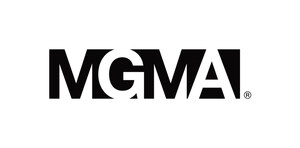ENGLEWOOD, Colo., May 6, 2021 /PRNewswire/ -- Medical Group Management Association (MGMA) releases a special report, "Quantifying COVID-19: Measuring the Pandemic's Impact on Medical Practices," that uncovers the impact of the pandemic in healthcare operations and provides data-driven benchmarks to help medical practices recover to pre-pandemic targets.
The data, found in the MGMA 2020 Monthly Survey, combines a year's worth of quantitative data from 142 groups and 1,252 providers from across the country, as well as insights from healthcare leaders who continue to navigate the road to recovery.
"The data tells the story of a very challenging time in history and how quickly and creatively a majority of practices were able to pivot and survive," said Andrew Swanson, MPA, CMPE, vice president of Industry Insights at MGMA. "To sustain patient care and volume, support staff working remotely, enhancing safety procedures and embracing telehealth, practice leaders and healthcare workers adapted to extraordinary levels to overcome the pandemic's impact."
Key Findings
Work RVUs (wRVUs) rebounded faster than patient volumes
- wRVUs hit the lowest levels in April 2020 and began to stabilize and experience significant increases in May and June for all provider types. By June 2020, wRUVs were near or above levels from pre-pandemic months. Patient volumes rose in June 2020, according to a June 2020 MGMA Stat poll, however, not at the rate of wRVUs.
- The results align with other major studies in 2020 including research from Harvard University and healthcare technology company Phreesia which reported the cumulative number of visits across 2020 was 5% to 6% below a typical year trend.
Specialist physicians saw the largest decrease in compensation
- Specialist physicians — surgical and nonsurgical — saw the steepest decrease in compensation during the onset of the pandemic and extending through summer months. The suspension of surgeries and elective procedures, along with a decrease in referrals and affiliated hospitals being overwhelmed by COVID-19 care, negatively impacted specialist volumes.
- Primary care providers (PCPs) also saw steep compensation drops in March and April 2020, but the expansion of telehealth largely restored volumes and corresponding compensation later in spring.
- Overall, the impacts of the pandemic varied based on compensation plans across multiple specialties. Volume-driven compensation plans were hit the hardest, whereas many practices in risk-based arrangements with prospective, per-patient per-month payments were able to keep compensation levels higher.
Total operating costs decreased
- As the demand for cleaning supplies and personal protective equipment (PPE) surged in 2020, practices incurred increased costs, many of which simultaneously faced diminished revenue from the decline in patient visit volume.
- An August 2020 MGMA Stat poll found that 98% of healthcare leaders reported an increase in the total cost of obtaining PPE. Of that overwhelming majority, 15% noted that costs for PPE increased by more than 100% compared to 2019 costs.
- Though PPE costs surged, decisions to cut spending elsewhere in the practice (including layoffs and furloughs), as well as decreasing in-person patient visits, likely mitigated the overall impact of the price hikes for items such as face masks, respirators, gloves, gowns and other PPE.
Pandemic accelerated the intense physician market
- The pandemic took a toll on the nation's physician workforce, with 28% of healthcare leaders reporting an unexpected physician retirement in 2020.
- With physicians exiting the workforce and shortages across multiple specialties, 2021 will continue to be a year of recruiting and hiring new physicians. Hiring advanced practice providers (APPs) will increase in 2021 to offset physician hiring.
6 Keys to Medical Practices' Recovery Amid COVID-19
Through interviews with healthcare leaders, these were the top factors for surviving the pandemic's impact:
- Fast and effective response to relief/aid offerings
- Stability in staffing
- Finding the right telehealth fit
- Rethinking patient payments and collections
- Sustaining engagement with patients
- Taking care of each other
To request access to the "Quantifying COVID-19: Measuring the Pandemic's Impact on Medical Practices," and other resources from MGMA DataDive, please visit.
About MGMA
Founded in 1926, the Medical Group Management Association (MGMA) is the nation's largest association focused on the business of medical practice management. MGMA consists of 15,000 group medical practices ranging from small private medical practices to large national health systems representing more than 350,000 physicians. MGMA helps nearly 60,000 medical practice leaders and the healthcare community solve the business challenges of running practices so that they can focus on providing outstanding patient care. Specifically, MGMA helps its members innovate and improve profitability and financial sustainability, and it provides the gold standard on industry benchmarks such as physician compensation. The association also advocates extensively on its members' behalf on national regulatory and policy issues. To learn more, go to MGMA.com or follow us on LinkedIn, Twitter and Facebook.
Media Contact:
Hollon Kohtz, Assistant Director of Public Relations
[email protected]
303.397.7892
317.847.5658 (Cell)
SOURCE Medical Group Management Association

Related Links
WANT YOUR COMPANY'S NEWS FEATURED ON PRNEWSWIRE.COM?
Newsrooms &
Influencers
Digital Media
Outlets
Journalists
Opted In





Share this article